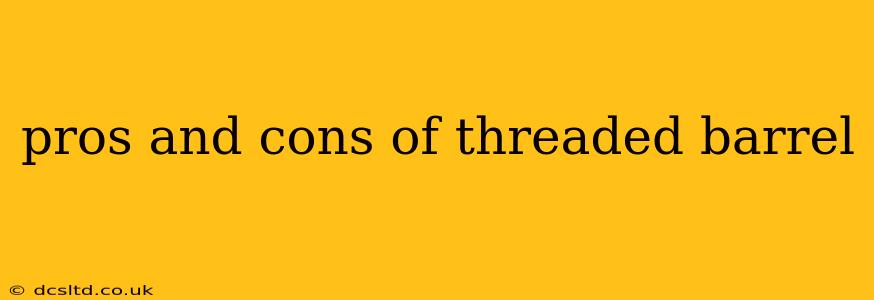Choosing the right barrel for your firearm is crucial for accuracy, performance, and overall shooting experience. One popular option is the threaded barrel, offering versatility but also presenting certain drawbacks. This detailed guide will explore the advantages and disadvantages of threaded barrels, helping you make an informed decision.
What is a Threaded Barrel?
A threaded barrel is a firearm barrel with external threads at the muzzle end. These threads allow for the attachment of various accessories, most notably muzzle brakes, suppressors (silencers), and flash hiders. This modularity provides significant customization opportunities for shooters.
Pros of Threaded Barrels:
Increased Versatility and Customization: This is arguably the biggest advantage. The ability to attach different muzzle devices significantly impacts the firearm's performance and handling characteristics.
- Improved Recoil Management: Muzzle brakes redirect propellant gases to reduce felt recoil, leading to faster follow-up shots and improved accuracy, particularly beneficial for larger caliber firearms.
- Reduced Flash Signature: Flash hiders minimize the bright muzzle flash, improving shooter visibility in low-light conditions and tactical operations.
- Sound Suppression: Suppressors drastically reduce the sound of gunfire, making them invaluable for hearing protection, reduced noise pollution, and potentially enhanced accuracy due to decreased recoil.
Enhanced Accuracy (Potentially): While not guaranteed, a properly installed and chosen muzzle device on a threaded barrel can potentially enhance accuracy by mitigating muzzle rise and recoil. However, this is heavily dependent on the chosen device and the shooter's technique.
Resale Value: Threaded barrels often command a slightly higher resale value compared to non-threaded counterparts, as they offer greater customization options to future owners.
Cons of Threaded Barrels:
Increased Cost: Threaded barrels generally cost more than their non-threaded equivalents, adding to the overall firearm expense.
Potential for Damage: Improperly attaching or removing muzzle devices can damage the barrel threads, compromising accuracy and potentially rendering the barrel unusable. It is essential to use the correct tools and techniques.
Added Length and Weight: Threaded barrels, particularly when fitted with a muzzle device, are longer and heavier than non-threaded versions. This can affect balance and maneuverability, especially in close-quarters situations.
Legal Restrictions: In some jurisdictions, threaded barrels might be subject to specific legal regulations, especially concerning the attachment of suppressors. It's crucial to understand the relevant laws in your area before purchasing or modifying a firearm with a threaded barrel.
Frequently Asked Questions (PAAs):
Are threaded barrels harder to clean? While not inherently harder to clean, threaded barrels require extra care to ensure that debris doesn't get lodged in the threads. Thorough cleaning and the use of a barrel brush specifically designed for threaded barrels is recommended.
Do threaded barrels affect accuracy negatively? A properly installed threaded barrel shouldn't negatively impact accuracy. However, a poorly installed muzzle device or damaged threads can affect accuracy.
Can I thread my existing barrel? It is possible to have an existing barrel threaded by a qualified gunsmith. However, this is a specialized procedure and may not be feasible or cost-effective for all barrels. The gunsmith must possess the appropriate tools and expertise.
How do I choose the right muzzle device for my threaded barrel? The choice of muzzle device depends on your priorities (recoil reduction, sound suppression, flash hiding). Consider factors like caliber, firearm type, and intended use.
Are threaded barrels legal everywhere? The legality of threaded barrels and associated accessories varies widely by jurisdiction. Check your local and state laws before purchasing or using a threaded barrel.
Conclusion:
The decision of whether or not to opt for a threaded barrel depends largely on individual needs and priorities. The increased versatility and customization are attractive advantages, but potential increased costs, legal limitations, and the risk of damage should be carefully considered. Weighing the pros and cons will help you determine if a threaded barrel is the right choice for your specific firearm and shooting style. Remember to always adhere to safe firearm handling practices and consult relevant legal regulations.
